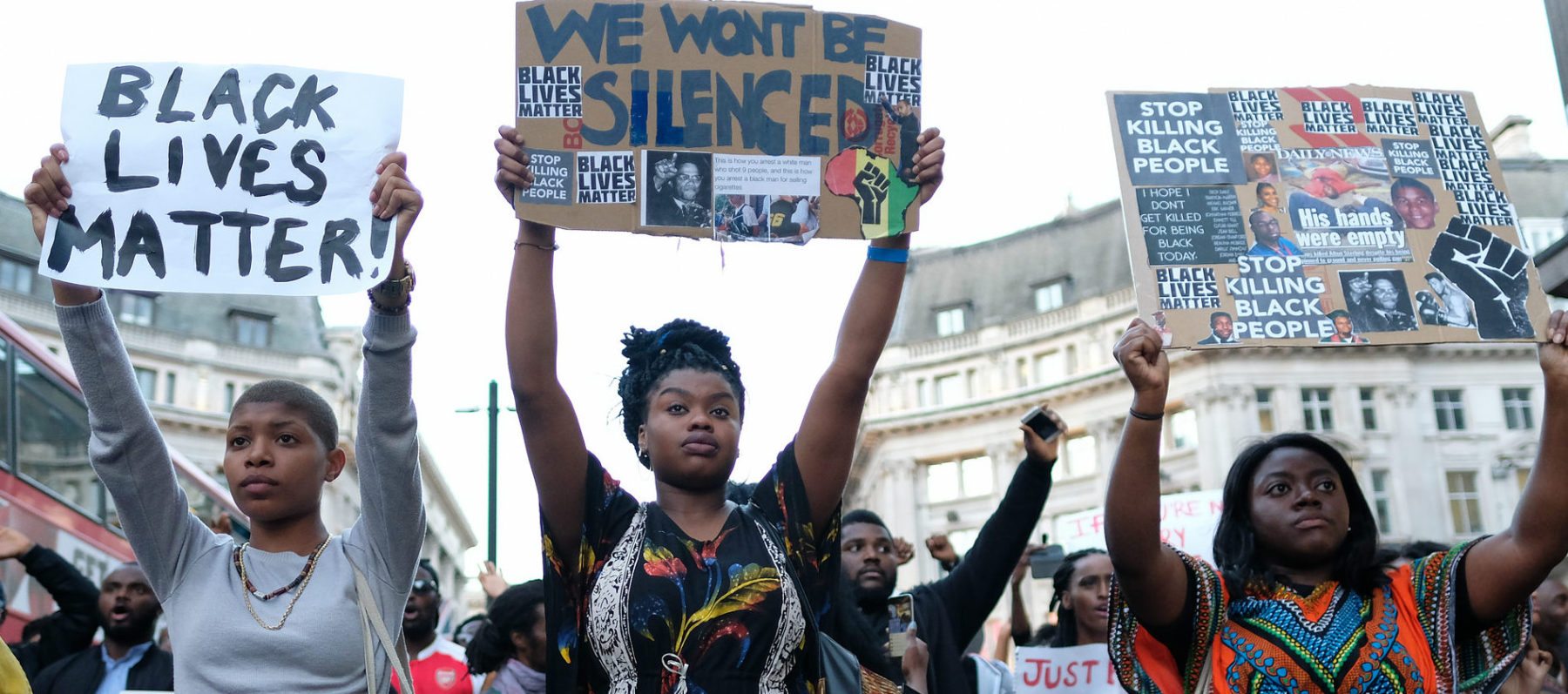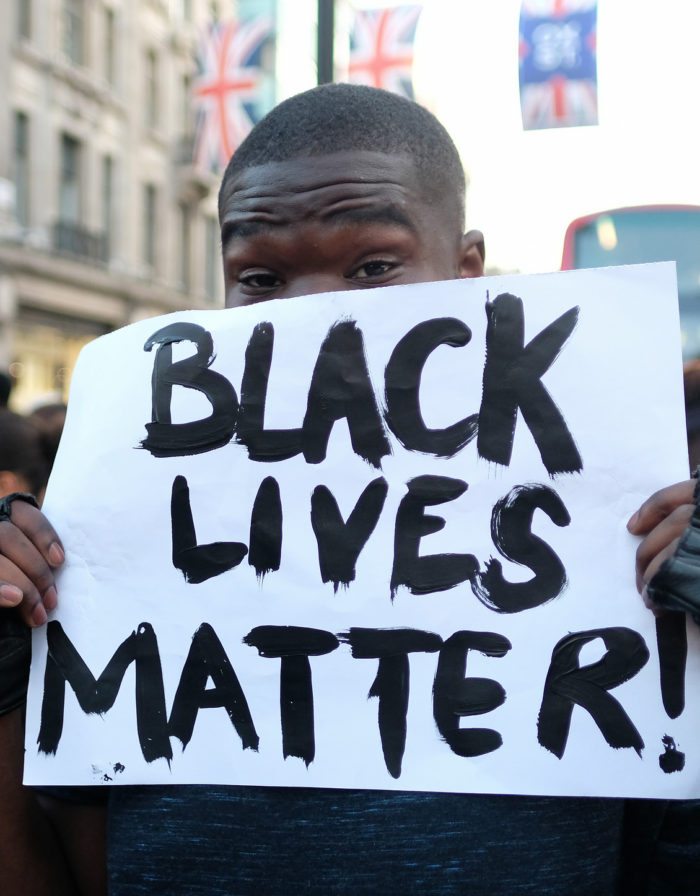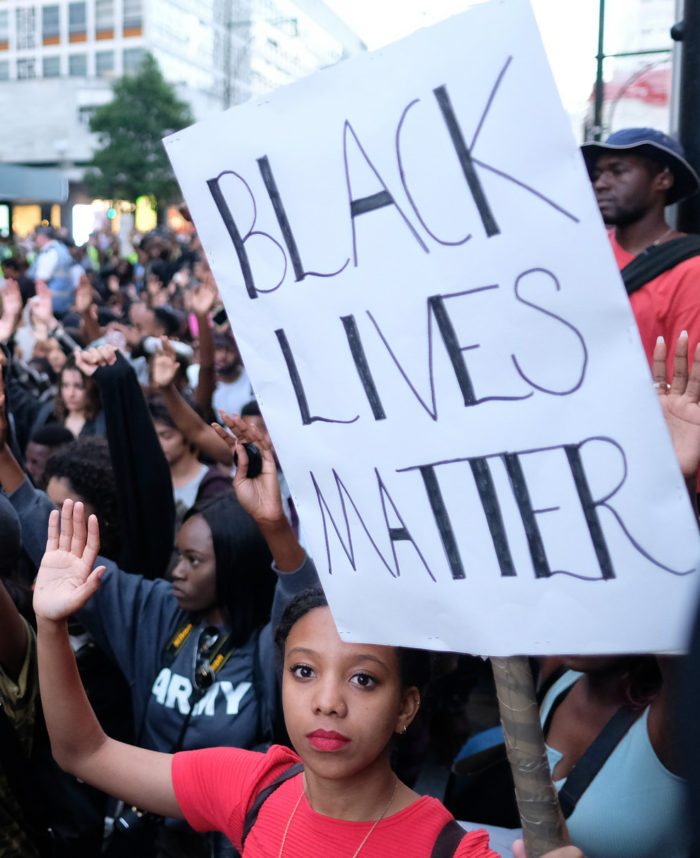The young leaders bringing Black Lives Matter to the UK
“Silence in the face of any sort of oppression is taking the side of the oppressor,” said Ayo Akinrele. The second-time sabbatical officer at Liverpool Hope University organised a march in Liverpool last month, which was partially in memory of Mzee Mohammed, an eighteen year-old black man who died in police custody on Wednesday 13th of July, just three days before the demonstration: “I was pleased to see students who didn’t define as black at the march. It reminded me how important it is to show support when it’s not your issue.”
Liverpool’s hundreds called out the treatment of black people by the criminal justice system as just one example of an institutional racism
Mohammed died after being detained by Merseyside Police at Liverpool One shopping centre. An ambulance was called following unconfirmed reports that the teenager was behaving erratically, and he died that evening at Royal Liverpool University Hospital. Days later, at the march organised by Akinrele, Liverpool’s hundreds called out the treatment of black people by the criminal justice system as just one example of an institutional racism that knows no country borders.
“To say black people have a less fatal experience here doesn’t negate from the importance of the campaign,” Ayo told the Boar. “It’s all about relativity to the local circumstances.” He points to policies birthed in the UK with damning results.
Police were criticised for ‘abusing’ their power to stop and search anyone they suspected could be carrying dangerous items in a police report this year, given less than a third of searches actually led to arrests. Black people have been searched more than white people in nearly all regions of the UK, with the disparity reaching as high as 17 black people searched for every white person in some counties.
Black representation can be seen as tokenistic if it isn’t coupled with changes of policy
A special constable himself, Ayo challenges with a reference to US senator Jesse Jackson what the face of UK policing could look like if we only had more black police officers: “It would go a long way to improving the image of the institution.”
“Black representation can be seen as tokenistic if it isn’t coupled with changes of policy particularly around stop and search, and other such policies which disproportionately affect black people.”
The number of black and other ethnic minority police officers trailed in single digits for the last decade. 5.5% of UK police officers were of a minority ethnic background in 2015, falling below 1% in northern counties and Wales and as of 2015, just over 1% of the UK’s police officers were black.
Institutional racism in the US was shipped there from the UK – it’s been woven into the fabric of the country for so long
Aliyah Hasinah, co-organiser of a 1,000-strong march in Birmingham told us that it came down to “rehumanising black people in the UK”. Her first steps towards understanding why we should be fighting for black lives appealed to our history: “Institutional racism in the US was shipped there from the UK – it’s been woven into the fabric of the country for so long.”
“The countries have different problems, but that’s what Black Lives Matter UK is addressing: illegal deportation centres, treatment of refugees, privatised prison systems with disproportionately large numbers of black males […]”
Privately managed prisons were introduced to the UK in the 1990s, allowing for governments to set up contracts to send prisoners to security companies for incarceration. The institutions have come under fire for jailing a disproportionately large number of black people, both in the UK and in other countries where they are used. According to the Equality and Rights Commission, black people represent 10% of the prison population in the United Kingdom while only constituting 3.5% of the general population.
According to the Equality and Rights Commission, black people represent 10% of the prison population in the United Kingdom while only constituting 3.5% of the general population
Aliyah commented what the movement needed now was longevity: “There’s been a lot of hype, now it’s just trying to channel that in a constructive and consistent way, so it’s not just us jumping up whenever there’s an incident.”
Attendee and speaker at the Nottingham demonstration Glenn Simpson echoed the same sentiment: “The time for knee-jerk reaction is over, and it’s something that needs to be addressed now.”
Recent protests in memory of Mark Duggan, a black man who was shot by London Metropolitan Police on the 4th August 2011, sparking the infamous London riots, fell under criticism on social media for the disruption they caused by blocking transport routes across the country, notably a motorway into London’s Heathrow airport. Protestors were removed and some arrested.
Ayo laid out a distinction in response: “With Black Lives Matter, it’s about belief in the cause more so than belief in the tactic.”
Direct peaceful action is a positive way of bringing publicity to an issue and sometimes it can be pivotal to bringing about change
“Protests will always cause inconvenience to others, but it can never be compared to the inconvenience that people suffering from the issue are going through.”
“Direct peaceful action is a positive way of bringing publicity to an issue and sometimes it can be pivotal to bringing about change. But it has to exist as a tactic within a strategy.”
On the other end of the spectrum, should young people be slammed for #activism in the place of on-the-ground support? Against a post-Brexit backdrop where including activism into the online worlds of vast swathes of the country’s youth has been characterised insincere and not genuinely helpful, Ayo told us there’s a valuable place for online petitions and social media, but “recognise the limitations of your reach – a lot of your [social media] friends are like-minded already.”
The movement, […] is one of creating a new narrative: “we are redefining what it means to be black and British.”
“With the right sort of guidance, and if the strategy is clear, younger people will find it easier to convert their timeline activism into grassroots campaigns happening in the community.”
Aliyah agrees that no one way of supporting the movement should be championed over the rest: when faced with a “multifaceted problem” we need to know there’s more than one solution. The movement, for her, is one of creating a new narrative: “we are redefining what it means to be black and British.”
When I ask her what she wants to tell UK students, she says what it took to mobilise a thousand people in Birmingham was just two friends with a last-minute plan and two days notice: “You are all leaders.”



Comments